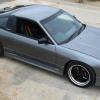Oh Sh%t No Breaks!
Announcements
-
Latest Posts
-
By Dose Pipe Sutututu · Posted
Proof I drive my car -
This should be the nail in every FFP coffin everywhere. What an absolute downgrade. Suprised RB26 people didn't get a better intake manifold with longer runners seeing stuff like this.
-
By Dose Pipe Sutututu · Posted
I do like the look of these things (minus the ugly flat top surface with the text) https://rajabracing.com.au/product/nissan-rb25det-neo-intake/ Retains the OEM bottom runners, for that phat low range. If you want response king, maybe go with the Plazmaman pipe work, here's my old setup from a decade ago -
By robbo_rb180 · Posted
Torque will suffer greatly, will try and find dyno difference on r34 with gt30 between stock and plazmaman short runner. like 2000-3000rpm power rdip at least. EDIT Green line is stock manifold, others is plazmaman short runner I also had a rb25 with greddy and q45 TB back in the day and was shit daily driving. Plazmaman top plenum with stock runner and DBW made it so much nicer.
-






Recommended Posts
Create an account or sign in to comment
You need to be a member in order to leave a comment
Create an account
Sign up for a new account in our community. It's easy!
Register a new accountSign in
Already have an account? Sign in here.
Sign In Now